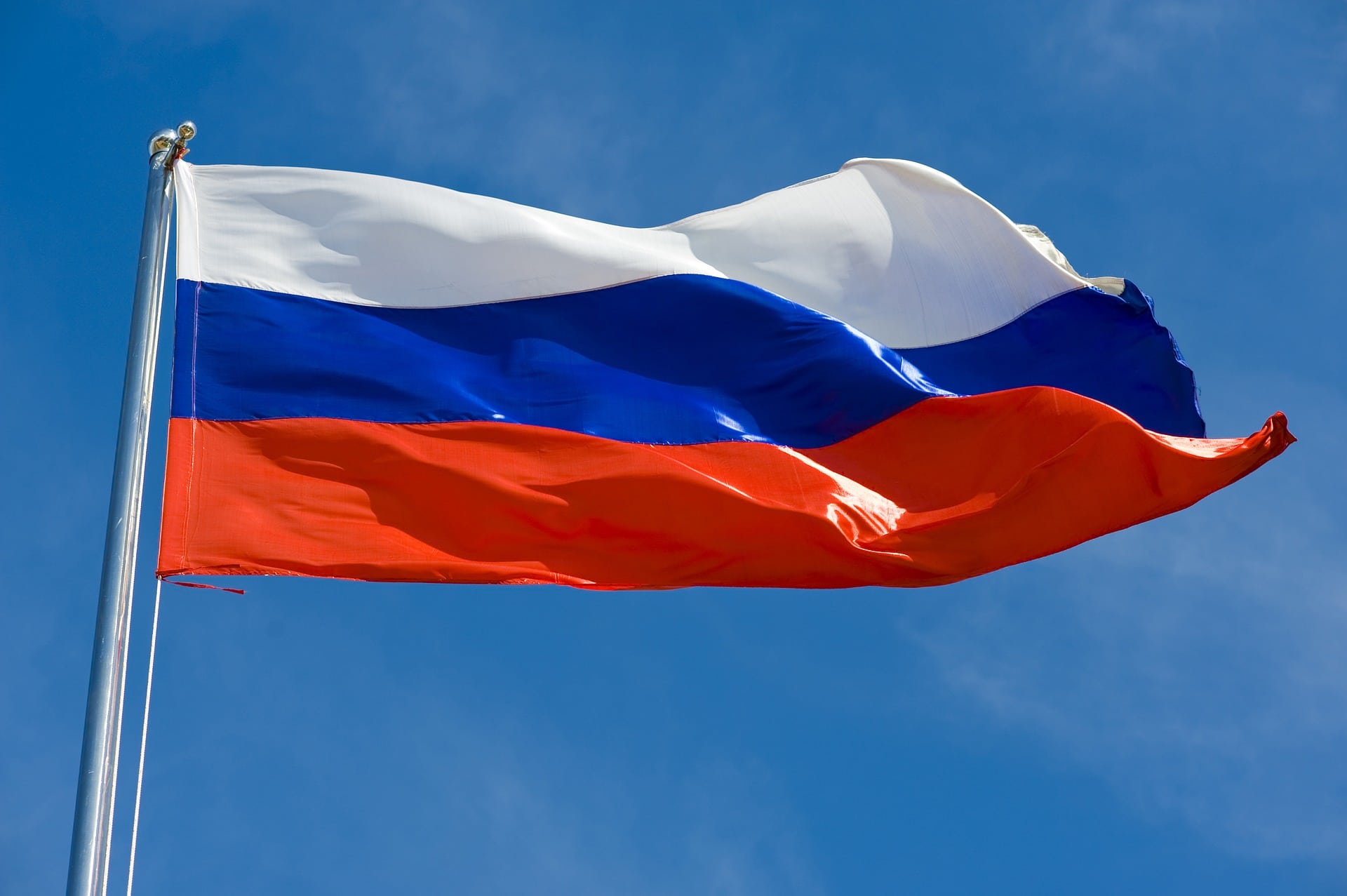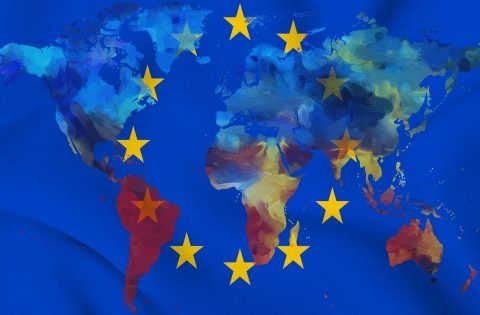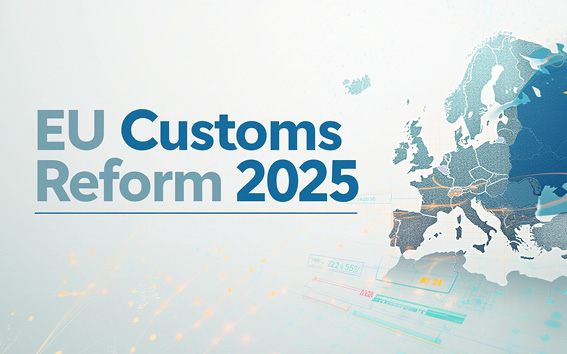Why EU sanctions against Russia exist
The EU had already imposed sanctions against Russia after Russia annexed Crimea in 2014. In the course of the Russian invasion of Ukraine since 2022 and against the backdrop of the deterioration of the human rights situation in Russia and the death of Alexei Navalny, the sanctions imposed were greatly expanded.
The European Union describes the main aim of the Russia sanctions as restricting the ability of certain individuals, companies and institutions to act in order to prevent Russia from taking further steps against Ukraine. At the same time, the sanctions against Russia should have as little impact as possible on EU companies and citizens.
Russia embargo: legal basis since 2014
The origins of the Russia embargo date back to 2014, when the European Union issued its first restrictive measures following the annexation of Crimea in violation of international law. Regulations (EU) 833/2014 and 269/2014 created the legal basis for sanctions aimed specifically at restricting the ability of Russian actors to act. With the full-scale attack on Ukraine in 2022, these embargoes were drastically tightened and now include extensive economic, financial and trade restrictions that go far beyond the original 2014 measures.
Sanctions also apply without direct foreign trade or links to Russia
In 2021, Germany exported goods worth 26 billion euros to Russia. The companies concerned are usually well aware that these exports are subject to regulations. However, financial sanctions imposed by the EU have more far-reaching consequences. For example, a Russian organization on the European financial sanctions list (CFSP) may neither be supplied nor paid for a delivery. Even the submission of an offer to sell or the general establishment of business relations could have consequences. This would apply even if the sanctioned company in question was based in Germany or another European country and no goods were exported. In order to avoid violating the European Commission’s sanctions, caution is therefore also required for German companies without an export business for all business relationships.
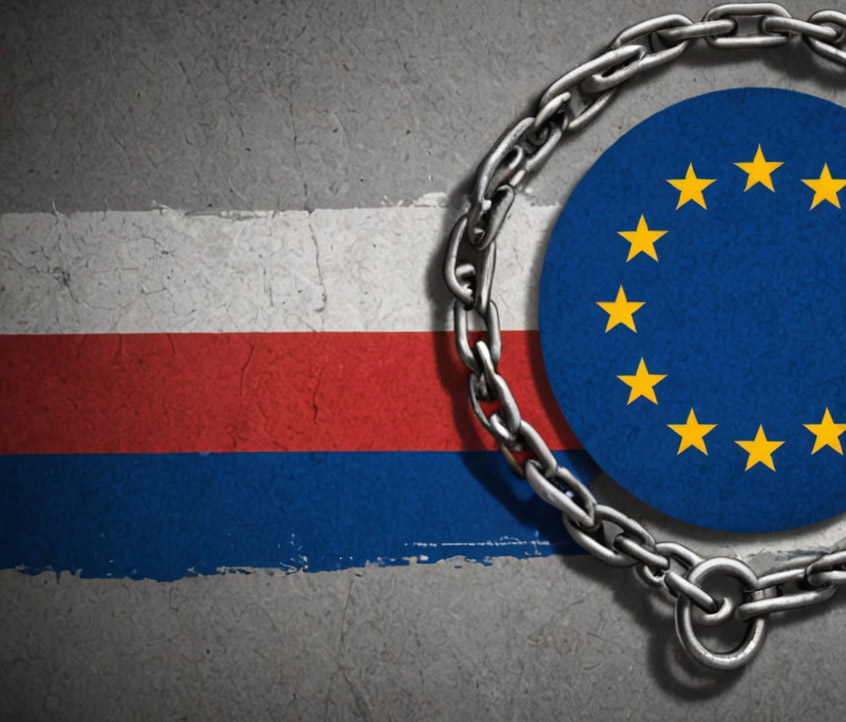
Overview of current sanctions against Russia
As part of the Russia sanctions, the European Union has defined a series of measures. In addition to diplomatic reactions relating to Russia, the main steps to be mentioned are those aimed at restricting individuals, organizations or institutions in Russia. Other important sanctions apply to trade relations between the EU and Russia, more specifically to the import of goods from Russia to the EU and the export of goods from the EU to Russia.
Sanctions against entities and individuals in Russia
Due to Russia’s actions in Ukraine and the human rights situation in Russia, among other things, the EU has decided to take action against a list of individuals and institutions in Russia. The sanctions affect President Putin and Foreign Minister Lavrov, Russian political parties, the Wagner Group, banks and companies from various sectors, among others.
On the one hand, travel from Russia to the EU and through the EU is prohibited for persons subject to sanctions. Secondly, the financial resources of these institutions and individuals are sanctioned: Their accounts with EU banks may no longer be used. EU individuals and companies would also be in breach of the existing sanctions with any other financial support. In addition, all profits that the frozen Russian accounts should generate will benefit Ukraine.
Economic sanctions against Russia
As part of the Russia sanctions, restrictions were imposed on bilateral trade, which customs enforces as the leading authority.
Goods-related EU sanctions against Russia
On the one hand, the EU sanctions affect far-reaching groups of goods. Exports from the EU to Russia are therefore restricted for certain goods from the following sectors, among others:
- Armaments
- Dual-use goods
- Advanced technology such as software
- Goods for oil refining
- Vehicles
- Luxury goods
In addition, there are import bans on coal, crude oil and petroleum products, for example. The latter may not be purchased or imported due to the EU measures, and even the forwarding of these goods by sea to the European Union is prohibited.
The regulations surrounding the import of diamonds are also important. A closer look is required when trading in gemstones, as the EU sanctions cover “diamonds originating in Russia” as well as “diamonds exported from Russia”, “diamonds transited through Russia” and “Russian diamonds processed in third countries” (source: European Council website, as of 16.07.2024).
In addition, the European Union stipulates that Russia is excluded from certain services. For example, software may not be sold in Russia, crypto wallets are banned and consulting and support in the IT and technology sector are prohibited.
However, there are also exceptions to the goods-related embargo against Russia. For example, special foods and products from the agricultural, healthcare and pharmaceutical sectors are not sanctioned.
Russia sanctions for trade
In addition to certain groups of goods, the European Union’s trade restrictions also cover trade movements by air, water and land:
- Road transport companies from Russia and Belarus are not allowed to drive into EU territory.
- Air carriers from Russia must avoid EU airports and are not allowed to fly into or over EU airspace. In addition, there are export bans on key goods that the Russian aerospace industry needs to maintain its fleets.
- The Russian maritime fleet is no longer allowed to call at ports in EU territory.
Sanctions against Russia with effect on media
Due to ongoing disinformation and propaganda campaigns – including in the context of the war in Ukraine – the EU has also imposed sanctions on a list of Russian media sources. They are no longer allowed to distribute their content within the EU – regardless of the distribution channel (cable, satellite, internet, etc.). However, media from Russia are still allowed to operate in the EU. This is stipulated in the Charter of Fundamental Rights. Further measures against Russian media are implemented via the above-mentioned institutional and personal sanctions.
Attention: Note the export clause!
Just how complex and far-reaching the Russia sanctions are can also be seen in the export clause, which came into force at the end of 2023. It concerns the export of a number of specific goods and states that “in the case of sale, supply, transfer or export to a third country (with the exception of partner countries), re-export to Russia and re-export for use in Russia is prohibited by contract.” (Source: Website of the European Council, status: 16.07.2024)
Financial sanctions against Russia
The EU sanctions against Russia also have an impact on the financial sector. To this end, the EU has laid down the following:
- Financial transactions with the Central Bank of Russia are prohibited.
- Any transfer of EU banknotes to Russia is prohibited.
- Banks from Russia and Belarus are no longer allowed to use the SWIFT system.
- The Russian messaging service SPFS is banned within the EU.
Where can I find the latest regulations or further help?
The latest updates on the Russia sanctions and a detailed FAQ section can be found on the EU Commission’s website.
The EU Sanctions Map also provides a comprehensive insight into all existing EU sanctions, including travel bans.
Preventive measures against Russian circumvention of sanctions
In the past, various attempts have been made by Russian organizations or individuals to circumvent the effects of the Russia sanctions.
However, in order for the sanctions against Russia to be effective, the EU has tightened up its package of measures. In this context, third countries are of particular importance. Among other things, institutions are to be prevented from providing aid to circumvent EU sanctions. In addition, the transit of certain goods through Russia and the entry of certain ships for transhipment in EU ports has been prohibited. There are also further restrictions and requirements in the financial sector. You can read more about this in the EU Council’s list.
What sanctions have other countries imposed?
It is not only the EU that has imposed embargoes against Russia. The US and the UK, for example, have also imposed comprehensive sanctions in the financial sector, import and export restrictions and restrictions on services in trade with Russia and Belarus.
It is important for EU companies to note that non-EU sanctions may also be relevant when dealing with Russia. This is the case for US sanctions, for example, if the trade in goods involves a US person, US organization or US goods as defined under US law. US secondary sanctions also apply to activities that support persons sanctioned by the USA.
Further information on US sanctions against Russia can be found on the website of the International Trade Administration, among others.
More information on UK sanctions against Russia can be found, for example, on the website of the UK government.
Movement of goods from the EU to Russia and vice versa: Which sanctions lists apply?
The EU sanctions are implemented on the following lists:
- EU_CFSP (Consolidated list of persons, groups and entities subject to EU financial sanction) – the majority of measures are implemented here as financial sanctions
- EU_RUSD (Russia embargo on dual-use goods) – currently contains persons who were listed in 2014 following the annexation of Crimea so that they no longer receive dual-use goods
- EU_RUSK (Russia embargo for the capital market) – includes persons who were listed in 2014 after the annexation of Crimea so that they cannot receive financial services with a term of more than 90 days; as well as legal entities, organizations or institutions with which it is prohibited under Article 5h of Regulation (EU) 2022/345 to use specialized messaging services for the exchange of financial data from 12 March 2022.
With the sixth package of sanctions against Russia of 03.06.2022, the EU extended the effect of the EU_RUSK to include bans on the provision of services in areas such as auditing and business and PR consulting for the government.
The US sanctions:
- US_SDN (Specially Designated Nationals And Blocked Persons List)
- SSI (Sectoral Sanctions Identifications List)
- CAPTA (Correspondent Account or Payable Through-Account Sanctions)
- CCL (Commerce Control List)
- Entity List 49
The sanctions of the United Kingdom:
- GB_HMT (Consolidated list of Financial Sanctions Targets in the UK)
Is a breach of EU sanctions a serious criminal offense?
In response to Russia’s war of aggression against Ukraine, the EU has imposed a series of sanctions against Russia. These include, for example, certain economic sanctions against individuals and organizations, such as the freezing of assets. Furthermore, massive restrictive import and export restrictions. This means that European companies are prohibited from selling certain products to Russia. Conversely, Russian companies are also no longer allowed to sell certain products to the EU. The export ban also includes an embargo on weapons and military items. All sanctioned products are listed in the EU list of prohibited products. Trade with companies and individuals sanctioned by the EU due to the war in Ukraine is prohibited without exception. This affects all trade contacts, both exports and imports. Certain services for Russia such as engineering services, IT consulting or auditing are also prohibited. The member states are primarily responsible for implementing and monitoring the sanctions, but in cooperation with the European Commission. As the Russian war of aggression against Ukraine continues without interruption, all EU sanctions must be implemented in full. In order to standardize the different regulations of the member states in dealing with violations of EU sanctions, the Council of the European Commission included sanctions violations in the list of “EU criminal offenses” as a first step in November 2022. Following the decision in December 2022, the Commission also presented a proposal for the harmonization of criminal offences and penalties for breaches of EU sanctions. This should make it easier for Member States to investigate and prosecute. Among other things, this means that the same level of penalties would be set in all member states. The member states could then, for example, set a prison sentence of between one and five years for violations by individuals. Infringements by legal entities are also subject to penalties. Depending on the violation, companies could be fined at least 5% of their total global turnover or be sentenced to several years in prison. The following are two drastic examples of what can happen if EU sanctions are breached.
Serious accusation: arms exports from Frankfurt to Russia
The Federal Public Prosecutor’s Office accuses a southern German company of procuring machines for the manufacture of sniper rifles in order to support Russia’s arms industry. This constitutes a serious violation of the arms embargo imposed by the EU. An accused person was arrested in this regard at Frankfurt am Main airport. The former head of a machine tool manufacturer from Baden-Württemberg is alleged to have violated the Foreign Trade and Payments Act. In 2015, he allegedly concluded several contracts for the delivery of precision machines worth around two million euros. The machines were delivered to a weapons manufacturer in Russia, which used them to mass-produce sniper rifles. However, such deliveries had already been banned in 2014 due to the Russian invasion of Crimea. In addition, the accused company provided training for the operation of these machines. Such services were sanctioned and therefore also prohibited. Furthermore, the company in question also purchased several of the sniper rifles from Russia for test trials in 2015. He pre-dated the underlying purchase contract to 2014 in order to create the impression that he had already purchased the rifles before the Russian sanctions came into force.
1.3 million euro fine for companies in Schleswig-Holstein
At the beginning of 2023, the local court in Kiel applied for a penalty order against the manager of a company in Schleswig-Holstein. The company had violated the Foreign Trade and Payments Act due to the delivery of a construction machine to Russia. The machine had been used to build the bridge to Crimea. The machine in question was a hydraulic hammer used to drive piles for the bridge into the ground. The penalty order is now legally binding. The company in question must now pay a fine of 1.3 million euros to the state treasury. (Further details, only in german: https://www.tagesschau.de/investigativ/swr/eu-sanktionen-krim-unternehmen-kiel-strafgeld-101.html)
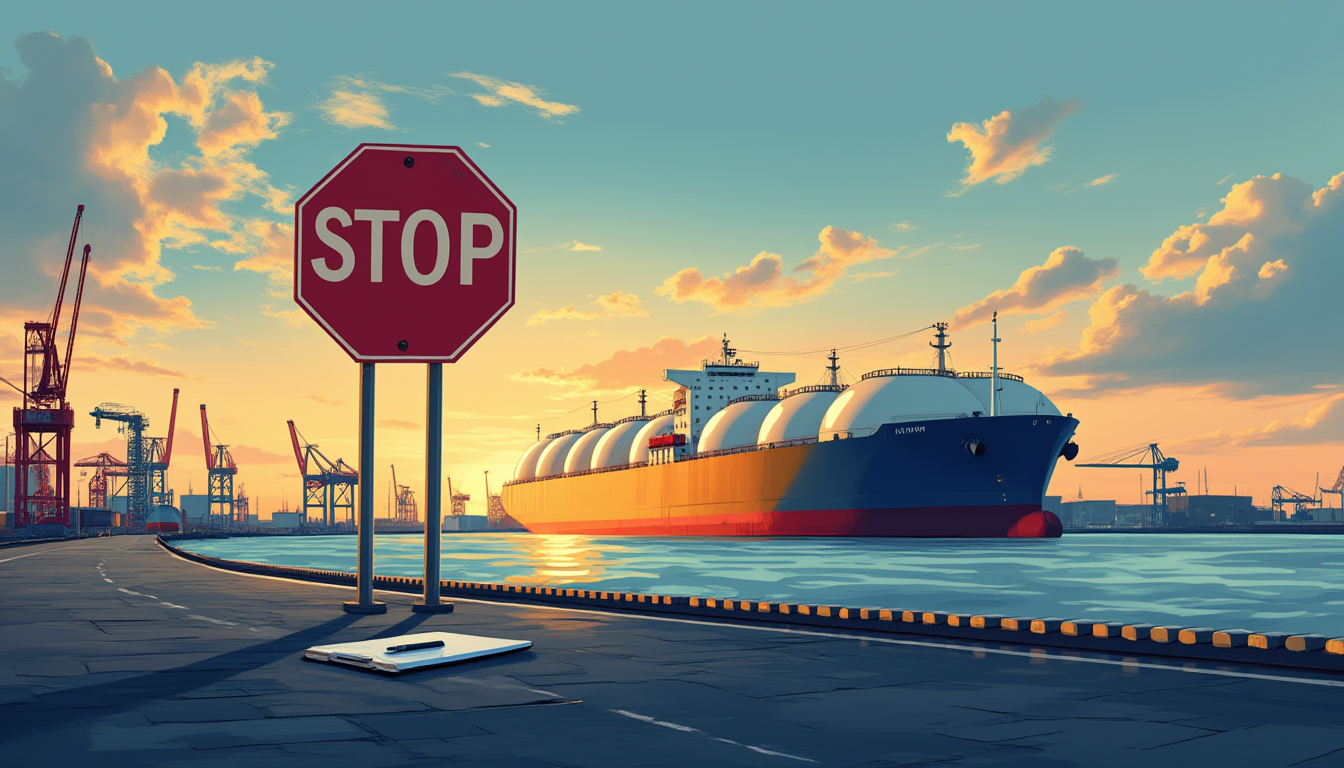
19th EU sanctions package – further restrictions on energy imports
Update 10/23/2025:
The EU member states have agreed on the 19th package of sanctions against Russia, which provides for further tightening of energy imports. At the heart of the new measures is a ban on imports of Russian liquefied natural gas (LNG), which is intended to further reduce Russia’s energy revenues.
The plans aim to further reduce Russia’s income from the sale of gas and oil and thus weaken the sources of financing for the war in Ukraine. The package was formally adopted after intensive negotiations between the EU member states and can now enter into force.
Implications for companies:
Companies in the EU that still import Russian LNG or use it in their supply chain must adapt their procurement strategies accordingly by January 2027 at the latest. Once again, the principle applies that all business relationships must be checked for possible links to Russia – even if these only exist indirectly via intermediaries.
What will change in concrete terms?
- LNG imports from Russia banned from 2027
- Crypto services banned for Russian players
- New banking sanctions in Central Asia
- 69 other persons/organizations listed
Sources:
- Tagesschau – EU states decide on further Russia sanctions – only in german
(https://www.tagesschau.de/ausland/europa/eu-sanktionen-russland-188.html) - Council of the European Union – Press release
(https://www.consilium.europa.eu/en/press/press-releases/2025/10/23/19th-package-of-sanctions-against-russia-eu-targets-russian-energy-third-country-banks-and-crypto-providers/)
18th EU sanctions package – impact on SMEs
Update 07/21/2025:
Objectives of the new sanctions package
The 18th EU sanctions package against Russia, which was adopted on July 18, 2025, is primarily aimed at reducing Russian revenues from oil exports. Particularly noteworthy is the significant reduction in the oil price cap, which is intended to make it more difficult to circumvent existing sanctions. The focus is on further restricting Russian energy exports, in particular by banning the use of the Nord Stream pipelines and tightening controls on oil transports to third countries. For SMEs, this means a much more complex review of their entire supply chain, as indirect business relationships with sanctioned entities are now also subject to stricter controls.
Extended compliance requirements
The catch-all rules already introduced in the 17th sanctions package have been further tightened. Medium-sized companies now bear an increased burden of proof when checking whether their products and services could potentially be used for military purposes – even if they are not explicitly on sanctions lists.
Conclusion: What do SMEs need to consider?
- Updating the sanctions list check: Regular and complete checks of all business partners are essential.
- Documentation requirements: All audit steps must be carefully documented in order to be able to prove compliance during inspections.
- Supply chain check: Indirect business relationships via third countries must also be checked for sanctions violations.
- Seek advice: In case of uncertainty, SMEs should consult foreign trade experts, as the regulations are becoming increasingly complex and violations can result in severe penalties.
17th EU sanctions package – tightening of the catch-all rules
Update 05/23/2025:
Objective of the EU sanctions
The 17th EU sanctions package against Russia, which was adopted on May 20, 2025, has two main objectives.
On the one hand, as with previous sanctions packages, the Russian economy is to be further weakened in the long term, particularly in strategic areas such as technology and finance. The signal effect of this measure should be particularly emphasized: In view of the chaotic negotiation situation, the EU wants to demonstrate its unity and ensure that companies within the EU do not do business with sanctioned persons, organizations or goods that could contribute to military use.
Expansion of the sanctions lists:
Over 150 new entries were added as part of the 17th EU sanctions package, covering both individuals and organizations.
Affected lists:
-
- EU sanctions list (CFSP): expansion to include Russian companies and individuals active in the defense industry, the energy sector and the IT sector.
- Dual-use goods list: Additional technologies and materials with potential military use have been included.
- Financial sanctions lists: Banks, investment companies and other financial institutions that support Russia have been added.
Extended compliance requirements:
The EU has strengthened the so-called catch-all rules. These oblige companies to report goods that are not explicitly listed if there is a suspicion that they could be used for military purposes.
Conclusion: What is changing?
The EU’s 17th sanctions package not only introduces new entries on sanctions lists, but also contains some substantial changes:
- The list of sanctioned entities has been expanded, making business partner screening more complex.
- New goods and technologies have been added to the list of goods, which means that more companies are affected by export controls.
- The tightening of the catch-all rules increases the responsibility of companies to check possible military uses even for non-listed goods.
Companies should carefully analyze the new regulations and adapt their compliance processes accordingly to avoid legal and financial risks.
16th sanctions package – anniversary of the invasion
Update 02/24/2025:
The EU’s 16th sanctions package was adopted on February 24, 2025. It aims to further weaken systemically important sectors of the Russian economy and increase pressure on Russia due to the ongoing war against Ukraine. The most important components of the package include
Energy: tighter restrictions on the supply of technologies and services essential to the Russian energy industry.
Trade: Extension of export and import bans, especially for industrial goods that are important for the Russian economy.
Transportation: New measures further restricting access of Russian ships and aircraft to EU ports and airports.
Individual sanctions: Additions to the list of individuals and organizations held responsible for their role in the war or for human rights violations.
Financial sector: Additional restrictions against Russian banks and financial institutions to further block access to the international financial market
The package published in the Official Journal on February 27, 2025. The sanctions and the update of the CFSP list will thus officially enter into force on this date. Further information can be found in the publication on EUR-Lex, the official portal for EU legal acts.
15th sanctions package – combating the Russian shadow fleet
Update 12/18/2024:
The 15th EU sanctions package focuses mainly on combating the Russian shadow fleet and tightening existing measures. The key points are:
- Listing of 52 additional ships in the Russian shadow fleet
- Ban on the use of European ports for listed ships
- Tighter controls to prevent circumvention of sanctions
- Extension of the list of sanctioned persons and entities
- New measures against companies in third countries involved in sanctions evasion
These measures complement the existing sanctions and are aimed at curbing maritime circumvention of trade restrictions by Russia. Companies should carefully review their business relationships and maritime transportation for compliance with the new provisions.
14th sanctions package – curbing the circumvention of sanctions
Update 07/01/2024:
The EU’s 14th sanctions package, adopted on June 25, 2024, focuses on preventing the circumvention of existing sanctions and contains additional requirements for Russian liquefied natural gas (LNG). Political parties, charitable foundations and non-governmental organizations have been banned from accepting funds from Russia. In addition, sanctions were imposed on 69 individuals and 47 organizations.
German companies should take greater care to ensure that they are not unwittingly involved in circumventing sanctions. This requires a careful review of supply chains and business partners.
13th EU sanctions package – European Union tightens sanctions on the anniversary of the outbreak of war
Update 03/01/2024:
Symbolically on February 24, 2024, the decision to add further entries to the EU sanctions list, the most extensive to date, came into force. Symbolic because this day marked the second anniversary of the outbreak of the Ukraine conflict.
As a result, 106 individuals and 88 entities were added to the EU CFSP list. A total of 2000 individual entries have already been added.
What is the focus of this sanctions package?
The EU continues to focus on weakening the Russian arms and military sector. For example, the supply of ammunition, drones, missiles, vehicles and microelectronics for military systems is to be made even more difficult.
Curbing the circumvention of sanctions is still part of the efforts: For example, parties involved in bringing armaments from neighboring countries to Russia have now also been targeted. The North Korean defense minister and several Belarusian companies and individuals have been sanctioned for this reason.
Another aspect of the new sanctions is to make it more difficult to build combat drones. In addition to companies in Russia, companies from other third countries that supply the Russian armed forces with essential components or help to circumvent sanctions have therefore now also been listed.
12th EU sanctions package against the Russian Federation
Update 02/01/2024
Towards the end of 2023, the EU member states agreed on stricter rules for compliance with sanctions against Russia. The new EU sanctions came into force on December 19, 2023. On the one hand, this is intended to prevent the circumvention of sanctions that have already been adopted. On the other hand, the sanctions are to be tightened. The sanctions package consists of three new regulations:
- Regulation 2023/2878 amending Regulation (EU) No. 833/2014 (Regulation 833/2014 (= contains restrictions on goods and services in relation to Russia)
- Regulation 2023/2873 amending Regulation (EU) No 269/2014 (includes restrictions on natural and legal persons, entities and bodies listed in Annex I of the Regulation)
- Implementing Regulation (EU) 2023/2875 (DVO 2023/2875)
The latter added further persons, entities and bodies (POEs) established in the Russian Federation to Annex I of Regulation 2023/2873.
Measures to combat the circumvention of existing sanctions?
The purpose of sanctions is to combat breaches of international law and human rights violations. Proven sanctions include trade embargoes, financial controls and entry bans. They are also used to prevent the development of weapons of mass destruction or to combat terrorism. In connection with the war in Ukraine, for example, the assets of Russian individuals and companies were frozen. Russian banks were excluded from the SWIFT network. The import of Russian oil and coal and the export of luxury goods to Russia were banned. In addition, travel bans were imposed on the President of the Russian Federation, Vladimir Putin, and Foreign Minister Sergei Lavror, among others. As Russia is attempting to circumvent the sanctions, measures have been taken to counter sanctions evasion, for example through third-country business:
- The purpose of the new Art. 3k para. 1a of Regulation 833/2014, which will apply from 24.03.2024, is to restrict the diversion of listed goods to Russia. It stipulates that companies must contractually prohibit the re-export of listed goods and technologies to Russia or for use in Russia when selling, supplying, transferring or exporting listed goods and technologies to contractual partners in third countries (= No Russia Clause). Furthermore, appropriate remedial measures must be contractually provided for in the event of a breach. This affects all goods listed in previous regulations. This includes goods from the aviation and aerospace industries as well as aviation turbine fuels, fuel additives and firearms and ammunition.
- A new Annex XL has been added. It lists technologies (so-called Common High Priority Items) that were found in Russian weapons systems in Ukraine.
- Also new is the obligation for service providers to collect and break down any price information on ancillary costs for Russian crude oil and petroleum products without access to the purchase price per barrel (= oil price cap) specified in Annex XXVIII of Regulation 833/2014. This includes, in particular, insurance and freight costs in the supply chain. The information must be made available to counterparties and the competent authorities on request. It should make it possible to verify compliance with the oil price cap.
- A further new information obligation concerns Art. 5 (6-7), Art. 5a (2) and (3) of Regulation 833/2014, which provides for information to be provided to economic operators in the event of an exemption from the prohibition on granting new loans and credits or an old contract regulation.
- The newly inserted Art. 5r of Regulation 833/2014 provides for a reporting obligation for transfers of funds of more than EUR 100,000 per quarter from the EU to third countries by legal POEs established in the EU. The reporting obligation arises if more than 40% of the POEs are held directly or indirectly by a POE established in the Russian Federation, a natural person domiciled there or a Russian national.
- Article 3(1)(j) of Regulation 269/2014 now lists companies formerly owned or controlled by EU companies that are now Russian companies if the Russian government has enforced the transfer of ownership or control.
Additional restrictions on the movement of goods and capital were also adopted.
Eleventh EU sanctions package
Update 09/27/2023
The eleventh EU sanctions package against Russia, Regulation 2023/1214, has been in force since June 24, 2023. The regulation primarily provides for making various ways of circumventing the previous sanctions more difficult or sanctioning them.
In particular, the list of so-called “military end-users” has been expanded by 87 companies to which restricted goods may no longer be sold from the EU. The EU assumes that goods sold to these companies were previously sold on to Russia. Unlike before, the list now no longer only applies to companies from Russia and Iran, but also from Armenia, Hong Kong, Uzbekistan, Syria and the United Arab Emirates.
The sanctions package also creates a new list (known as Annex XXXIII), which contains countries to which embargoed goods may no longer be delivered. Once the regulation has been adopted, this list will initially be empty. However, it can be expanded at short notice if there is a suspicion that a country is being used as a transshipment point for the onward delivery of goods to Russia.
In addition, the list of “strategic goods” has been significantly expanded and is now 158 pages long. In particular, numerous electronic components used in the construction of weapons may no longer be exported. The licensing and sale of intellectual property, for example the supply of construction or design plans for products, to Russia is also no longer permitted if they relate to the listed strategic goods.
The transit ban, which previously prohibited the transportation of dual-use goods through Russia, has been extended to a number of other embargoed goods. The aforementioned strategic goods may now also no longer be transported via Russian roads to Kazakhstan or Mongolia, for example. Conversely, it is now even more difficult for Russian exporters to transport goods to the EU. In addition to towing vehicles, truck trailers registered in Russia are now also no longer allowed to drive on EU roads.
As a result of the new sanctions, EU ports must deny access to ships suspected of transhipping Russian crude oil. Specifically, this mainly affects ships that have already attracted attention in the past for such transhipment.
With the new sanctions package, the EU is also establishing a reporting system with which the EU states will inform each other about the implementation of the sanctions. Licenses not granted due to sanctions must be transmitted by the EU states to the other states and the EU Commission within two weeks. If companies or individuals attempt to obtain a permit in another EU country once it has been denied, the authorities concerned must consult with the relevant institution in the first country.
In addition, the eleventh sanctions package establishes an “information obligation for everyone”. This means that all companies or, in theory, individuals are obliged to report information to the EU within 14 days that could be useful for the implementation of the Sanctions Regulation. The main purpose of this is to collect information on how Russia is implementing sanctions.
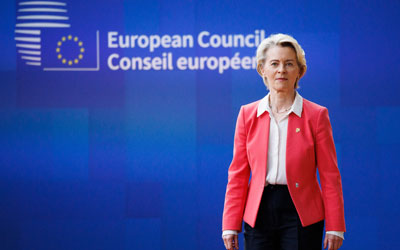
Tenth EU sanctions package: In planning
Update 02/17/2023
President von der Leyen announces new proposals for the Tenth EU Sanctions Package:
- Export bans on critical industrial goods worth €11 billion.
- Restrictions on dual-use and advanced technology goods.
- The restrictions will also be extended to seven Iranian companies to prevent deliveries to Russia.
- Propagandists, commanders and political leaders of Putin are also to be subject to sanctions.
The sanctions package must now be discussed and adopted unanimously by all member states, with the aim of having the tenth sanctions package enter into force on February 24.
Ninth EU sanctions package: expansion of the sanctions list and additional EU export bans.
Update 02/08/2023
The EU Commission has published the planned scope of a ninth sanctions package against Russia. This includes many other measures:
- 200 additional sanctions list entries against natural persons and organizations associated with or close to the Russian military
- comprehensive export bans on dual-use goods
- exclusion of three further Russian banks
Eighth EU sanctions package: strike against cryptocurrencies, accomplices and oil production
Update 10/06/2022
In order to make the oil price cap effective, restrictions now apply to the transportation of crude oil and, from 2023, to petroleum products. With the eighth sanctions package, the EU is also adding import and export bans as well as personal embargoes against companies and individuals. As with all other entries on the CFSP sanctions list, any business relationships or the exchange of goods are prohibited under penalty of punishment. This has always applied to the exchange of goods and financial resources. A new addition is a comprehensive crypto ban for Russian citizens and Russian residents. Any provision, management, trading or other services in connection with cryptocurrencies and wallets is prohibited.
In addition, the EU Council has now also extended the conditions for inclusion on a CFSP list: not only persons and organizations that circumvent the sanctions can now be placed on the sanctions list, but also if they indirectly aid and abet them!
A detailed report on which goods are affected by export and import bans or restrictions under the 8th sanctions package can be found in the EU Council’s press release.
Sixth EU sanctions package
Update 09/26/2022:
The sixth sanctions package further expands the number of sanctioned parties. This is not surprising. However, the EU has also taken further decisions to make it more difficult for the Russian government to access certain goods and services from Europe. The exclusion from the international SWIFT banking system has also been extended to three more Russian banks.
Further personal embargoes
In accordance with Implementing Regulation (EU) 2022/878) of 03.06.2022, financial sanctions were imposed on a further 65 natural persons allegedly close to the Russian military and 18 organizations, mostly companies active in the field of armaments, by adding them to Annex I of the original Regulation EU 269/2014. The CFSP list was expanded to include the persons concerned.
This was followed by Regulations (EU) 2022/1270 & (EU) 2022/1274 of July 21, (EU) 2022/1354 of August 4 and (EU) 2022/1446 of September 1, which increased the number of entries of mainly natural persons from 1110 to 1232. In addition, 110 Russian organizations are now subject to a financial embargo.
Capital market embargo extended to services and goods
Regulation (EU) 2022/879 extended the current Russian embargo for the capital market in accordance with (EU)833/2014 (EU_RUSK list) to other goods and services.
Previously, the regulation mainly affected companies active in the financial sector. The fact that there is now also an import ban on crude oil is particularly serious. However, special regulations have also been issued which, for example, allow the fulfillment of old contracts or exemptions for Bulgaria, Croatia and the Czech Republic.
Ban on services for the Russian government
Another new feature is that Article 5n now prohibits the provision of services to the Russian government in areas such as auditing and business and PR consulting. This also applies if these services are provided indirectly, i.e. via an intermediary client. It is therefore advisable to check whether a client is not close to the government and is merely brokering the services.
Entry into force of the Sanctions Implementation Act
Update 05/10/2022
The Sanctions Enforcement Act (SDG) is a decisive step by the German government to strengthen the effectiveness of EU sanctions in Germany. The aim of the law is to trace and freeze the assets of sanctioned persons and organizations more effectively and to prevent the circumvention of sanctions. To this end, the powers of the authorities, such as the newly created Central Office for the Enforcement of Sanctions (ZfS), have been significantly expanded.
This has direct and important consequences for companies. The compliance requirements increase considerably, as companies are obliged to carry out increased due diligence to ensure that no direct or indirect business relationships are maintained with sanctioned parties. This includes a close examination of the ownership structures of business partners. They must also proactively report the assets of listed persons to the relevant authorities. Violations can result in severe fines and reputational damage. The law therefore forces companies to intensify their internal risk management processes and the verification of their business partners (KYC – Know Your Customer) in order to avoid legal and financial disadvantages.
Exclusion of Russia from the SWIFT system
Update 02/28/2022
Following the military offensive in Ukraine, the Western community of states has now adopted numerous punitive measures against Russia that seemed unthinkable a short time ago. These now include the severe exclusion of banks from the Swift financial communication system. Just a few days ago, the broadcaster ntv described the measure as a “nuclear bomb among sanctions”, the use of which is considered unlikely due to the far-reaching consequences. We are familiar with this system from everyday bank transfers using the BIC or Swift code. It also enables financial transactions on an international level.
As a result of the exclusion, all Russian banks are now cut off from international payment transactions. As before, transfers to and from Russia are no longer possible – which makes foreign trade considerably more difficult. The exclusion from the system recently hit Iran very hard, with its oil exports collapsing almost completely as a result.
Far-reaching embargoes
In addition to an obvious arms embargo, further restrictions on the exchange of goods with Russia have also been decided. This includes not only goods, but also services. For details and questions, the BAFA has set up a hotline on its information page on the subject of the Russian embargo (only in german).
In addition to the aforementioned financial sanctions against natural and legal persons, the EU’s efforts are aimed at the following sectors:
Energy sector:
An embargo on technologies and goods is intended to make the further processing of crude oil more difficult. Services are also restricted. For example, it is to be made more difficult to renew Russia’s oil refineries or supply them with spare parts.
Financial sector:
Cuts to the Russian central bank are intended to destabilize the rouble exchange rate. According to the EU, more than half of the financial reserves will be blocked. The assets of all commercial banks will also be frozen and transactions with them prohibited. Decisive action is also to be taken against trading in Russian government bonds.
Transport sector:
All aerospace industry goods are subject to a general export ban. Around 75% of the aircraft used in civil aviation were built in the EU, the USA and Canada, so the loss of critical spare parts, for example, would have a direct impact on the country’s infrastructure.
